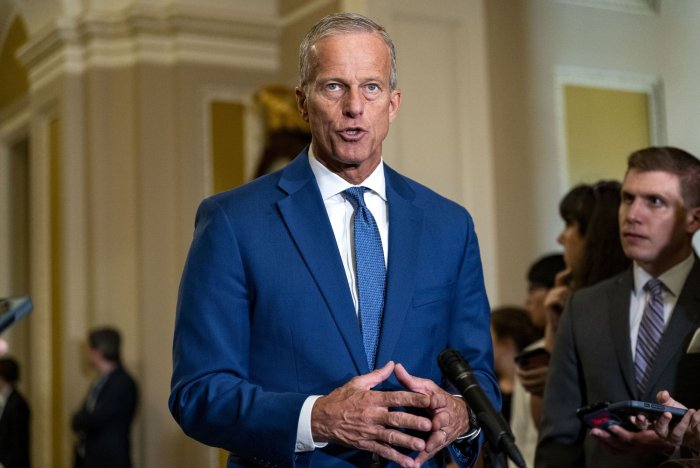July 9 (UPI) — U.S. President Donald Trump on Wednesday met the presidents of five African nations — Senegal, Liberia, Guinea-Bissau, Mauritania and Gabon — in what the White House describes as a push to deepen trade, including that involving precious metals.
During the public portion of the lunch in the State Dining Room, Trump said the United States was “working tirelessly to forge new economic opportunities involving both the United States and many African nations.”
The luncheon is part of a three-day summit of the nations in Washington, D.C.
“We’re shifting from aid to trade,” Trump said. “In the long run, this will be far more effective and sustainable and beneficial than anything else that we could be doing together.”
Trump said these five counties might be exempt from reciprocal tariffs on Aug. 1. Most U.S. trading partners already have been slapped with a 10% baseline tariffs.
The five African leaders praised Trump.
One by one, the leaders encouraged the United States to invest in their countries and develop their plentiful natural resources.
“I didn’t know I’d be treated this nicely,” Trump said. “This is great. We could do this all day long.”
In 2017, during Trump’s first term in office, nine African nation’s heads of state participated in a “working lunch” that included bigger nations, including Nigeria, Ethiopia and South Africa.
“This discussion and lunch dialog with African heads of state was arranged because President Trump believes that African countries offer incredible commercial opportunities which benefit both the American people and our African partners,” a White House official said.
The five invited nations have a combined population of 33 million people in a contingent with 1.55 billion people. Senegal, with 18 million, is the largest of the group. The five nations’ combined gross domestic product is only around $75 billion, according to the International Monetary Fund.
“It’s hard to tell why these five countries were picked,” Professor Paul Agwu of Nigeria’s University of Port Harcourt, told NPR. “We’ll see what comes out of it — but I doubt it’ll be anything new.”
Of the nations invited, all but Gabon, with a population of 2.2 million, are along routes used by migrants and drug traffickers from Latin America.
“All these countries are also departure points for illegal emigration,” Babacar Diagne, Senegal’s former ambassador to Washington, told the BBC. “That’s an extremely important point in his migration policy, and every day people are turned back at the borders.”
Liberia may be considering a proposal by the United States to accept people deported, including criminals.
In June, Trump issued a full travel ban for 12 nations, including seven from Africa: Chad, Republic of Congo, Equatorial Guinea, Eritrea, Libya, Somalia and Sudan. With partial bans in Africa are Burindi, Sierra Leone and Tongo.
All of the five nations invited to the White House are rich in mineral resources, including oil and gas, gold, iron ore and rare earth elements.
“We are not poor countries,” Nguema said. “We are rich countries when it comes to raw materials. But we need partners to support us and help us develop those resources with win-win partnerships.”
Nguema also pushed Trump to purchase directly from Gabon instead of companies.
“I’m sure that it’s more expensive compared to when you can come and buy directly from us,” he said.
Gabon holds around a quarter of the world’s known reserves of manganese, which is used in the production of batteries and stainless steel.
Last month, the Trump administration brokered a peace deal between the Democratic Republic of Congo and Rwanda, including potentially unlocking “substantial” untapped deposits of gold, cobalt and high-grade copper, as well as diamonds and lithium, which key element for powering the green power transition.
The DRC reportedly offered access to its resources to the United States in exchange for assistance in resolving the conflict after it effectively lost control of the east of the country at the beginning of the year.
“Tump is transactional — he wants to know what these nations can offer,” Professor David Okoye of Nigeria’s Niger Delta University told NPR.
The United States is concerned about China’s expanding impact in Africa. Beijing reportedly is scouting port locations along West Africa’s coast for possible military use.
“The U.S. has been watching Chinese interest in places like Gabon, Guinea, and Mauritania very closely,” said Cameron Hudson of the Center for Strategic and International Studies.
China is Africa’s top trade and investment partner.
The five nations’ leaders at the White House are not aligned with the 11-member BRICS, a group of headed by Brazil, Russia, India, China and South Africa, as well as Egypt, Ethiopia, Iran, Saudi Arabia, United Arab Emirates and Indonesia.
On Monday, Trump said countries that support BRICS nations would be slapped with an additional 10% tariff when across-the-board import duties on the United States’ trading partners take effect Aug. 1.
BRICS leaders earlier attended a two-day summit in Rio de Janeiro, Brfazil, that issued a formal statement critical of the U.S. tariff stance.
Liberia has been the victim of the closure of the U.S. Agency for International Development earlier this year, forcing the closure of health centers, and shortages in HIV medication and contraceptives. U.S. support previously made up nearly 3% of Liberia’s national income, which is the highest of any country, according to the Center for Global Development.
During the luncheon, Trump touted the closure of USAID.
“Trump is a businessman,” political analyst Mamadou Thior told CNN. “The USAID, which was a key partner for countries like Senegal, no longer exists. It’s up to them to talk to Trump, to see what new cooperation they can put forward.”
